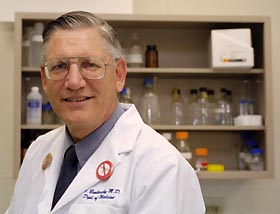|
This is an archived article.
For the latest news, go to the Advance
Homepage
For more archives, go to the Advance Archive/Search Page. |
||
|
Clinical
Research Director Balances
Research and Patient Care By Kristina Goodnough Dr. Herbert Bonkovsky is fascinated by science, especially biochemistry. He also enjoys medicine and caring for people. The result? A career as a clinical investigator, straddling the worlds of basic science research and patient care.
The latest step in that career has brought him to the Health Center, where he was recently appointed as program director for the General Clinical Research Center. The balancing act began during his days in medical school at Case Western Reserve, where he was invited to participate in a special curriculum that allowed a few students to do more research in their third and fourth years. The balancing continued after his residency in medicine at Duke University Medical Center, when he joined the Yale Liver Study Unit as a clinical trainee for the National Institutes of Health. Focusing on both research and clinical care became a real career when he joined Dartmouth Medical School. There he set up the school's gastroenterology unit and established a research laboratory at the VA Medical and Regional Office Center in nearby White River Junction, where he rose to chief of the Division of Digestive Disease. Clinical investigators have to be adept at balancing both worlds, according to Bonkovsky. They care for patients, but they also write proposals, seek funding, negotiate contracts and publish their research. "The rewards are many, but it can be too much of a hassle for many physicians, he says. It's distressingly common for physicians to drop out of clinical research." At the General Clinical Research Center, Bonkovsky plans to continue focusing on research and clinical care, keeping a foot firmly in both worlds. "The role of the Center is to make things easier for researchers," he says. "The Center provides the infrastructure. It helps with developing proposals, with drafting contracts, with staff support, whatever it takes." That help will be crucial for Bonkovsky as he continues his own research. Bonkovsky specializes in iron and porphyrin metabolism, and the liver, which he sees as the source of the greatest variety of the body's biochemistry. "The liver serves in maintaining blood glucose levels. It makes most of the proteins that circulate in the blood. It helps fight infections. It's a very important organ for maintaining the body's internal systems within narrow limits," he says. His interest in the liver and its diseases won him a role as one of 10 principal investigators around the country in the HALT-C clinical trial sponsored by the National Institute of Diabetes and Digestive and Kidney Diseases. He brought the trial to the Health Center from the University of Massachusetts Medical School, where he was previously professor of medicine, biochemistry and molecular biology. Bonkovsky is now recruiting volunteers to participate in the study, which looks at a possible new therapy for chronic hepatitis C patients who have not responded to treatment. He is also working on a study related to non-alcoholic fatty liver disease, a condition that affects between 20 and 25 percent of the U.S. population. "Basic research is fascinating, but some of us want to apply the knowledge we gain through our research directly to patients. That's the beauty of being a clinical investigator," he says. Bonkovsky is keen to introduce others to his world of balancing research and patient care. "Our goal is to get students and residents fired up about becoming clinical investigators," he says. "I have reached the point in my career where I'd like to help bring other people along." One of Bonkovsky's first administrative tasks as program director will be to integrate the Health Center's clinical trials unit with the General Clinical Research Center. "We want to bring together everything related to patient-oriented research into a single organization," he says. Another immediate goal is to reorganize and reallocate space in an optimum way for both the clinical trials unit and the research center. Bonkovsky says he also will focus major attention on the application for funding renewal that will be submitted to the national Center for Research Resources in February. "The application will require a lot of work but the research center, which now has more than 100 studies underway, has a good track record with good growth and productivity," he says. "I think our prospects for renewal and, in fact, for a considerable increase in funding, are very good." |

